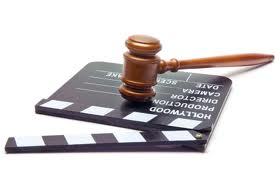I chose to review 3 podcast shows pertaining to entertainment law this week including the Law and Video Podcast, Gordon Firemark and Thomson CompuMark. These articles all dealt with generally the same topics pertaining to Trademarks, Copyrights, and intellectual property. In regards to the Law and Video Podcast the show discussed how trademarks mentioned the importance of understanding the copyright laws. On the show a lot of videographers, production companies and those starting out in business called in to ask legal questions to help them start out on the right course. One listener called in to ask about the use of The Star Wars Dark Vader character in his comedy shows. The lawyer mentioned to the listener that using known trademarks as a parody or satire is allowed as long as you do not use it to create a new work and claim it as your own. I thought this was interesting that the use of a trademarks need to be verified on every level because a trademark is something that is legal property. To listen to the article click here: http://itunes.apple.com/us/podcast/the-law-and-video-podcast/id262391771
The next article I reviewed is also from The Law and Video Podcast in which they interviewed entertainment lawyer, Gordon Firemark. As the show normally does they took in calls from people in the video production arena who have legal questions. Firemark discussed the difference of fair use and copyright infringement. He stated that fair use is a law that looks at the purpose and intention of the content, so if the content is for educational purposes with no intention to profit, the material that is copy written or has a trademark can be used as long as the intent and motive is correct. That same content can become an infringement if the material content becomes excessive and utilizes the content in a way that becomes profitable then this can be a way of copyright infringement. To listen to the article click here: http://itunes.apple.com/us/podcast/trademark-copyright-law-forum/id264628681
The last podcast that I listened to was a podcast from Thomson CompuMark. The title of this podcast is called “How The Power of Branding Drives Trademark Law.” In this article there was a speaker who was discussing the different legal battles that go through the courts regarding brands of certain companies. For example there was a legal case with Mattel vs. a restaurant in Canada who used the name Barbie’s for the name of their barbecue restaurant. Mattel lost the case and the speaker mentioned that, “Mattel became too cocky.” They had this trademark and didn’t even want a restaurant to have access to use their name because they felt it was an infringement. This shows me that as the brand of a company become famous the more chances they will get into legal battles over trademarks. http://www.lawdit.co.uk/reading_room/room/view_article.asp?name=../articles/Mattel%20Sues%20Barbie.htm
To listen to the article click here: http://itunes.apple.com/us/podcast/entertainment-law-update-podcast/id313301718
